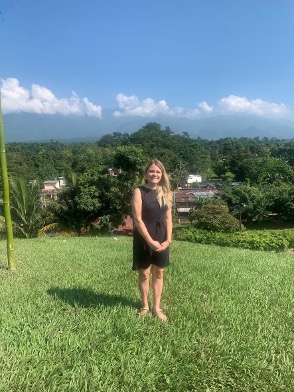Examining intimate partner violence in Guatemala
October is National Domestic Violence Awareness Month
Guatemala has the third-highest rate of femicide (the homicide of women based on gender) in the world. And according to UN Women, 21.2 percent of Guatemalan women have experienced physical or sexual violence from an intimate partner at some point in their lifetime.
USF College of Public Health (COPH) MPH student Caitlynn Carr, who is also a doctoral candidate in applied anthropology at the university, is studying intimate partner violence (IPV) among Guatemalan women.

As part of her doctoral research, funded by a Fulbright-Hayes Doctoral Dissertation Research Abroad Fellowship, Carr is conducting field research in Guatemala examining the barriers that indigenous women face when it comes to seeking help for IPV. Carr, who’s concentrating in maternal and child health, said examples of those barriers include governmental corruption, lack (and cost) of transportation, inability to take a day off from work, childcare issues and the fact that women rarely travel alone in the country. Other factors include racism against indigenous people, a machismo ideology, lack of services provided in Indigenous languages (there are 21 in Guatemala), fear of leaving a partner, economic dependence on a partner and others.
Carr’s research will also focus on ways to curb IPV.

Carr said she got interested in IPV in Guatemala when she visited the country with a Habitat for Humanity project in 2011. In 2015, she conducted research focused on Indigenous women’s psychosomatic/distress symptoms resulting from IPV.
“After conducting semi-structured interviews with 40 women and receiving surveys from 80 women, I found that only one of the participants sought formal services for the abuse that she experienced, illuminating a disconnection between IPV services and Indigenous women in rural areas of Guatemala [services are more prevalent/common in more urbanized areas],” Carr said.
Carr is currently living in Guatemala, immersing herself in the culture and living in the communities where she’s conducting her research. She cooks with community members, goes to church with them and builds friendships. Establishing these kinds of relationships is an important step to curbing IPV, Carr noted, as community-based and community-led programs have had more success than governmental programs at reducing IPV in Guatemala.

“Governmental programs oftentimes lack funding and resources, as well as personal outreach, which leads to limited accessibility and success. Oftentimes, nonprofit organizations fill in the gaps where governmental organizations fall short,” Carr said.
Carr, who plans on pursuing postdoctoral research on violence prevention and IPV after graduation, hopes the research will illuminate potential avenues for violence prevention among Indigenous communities when formal governmental efforts fail.
“The research situates violence against Guatemalan women from a life course perspective and examines social determinants of health from both a socioeconomic and sociohistorical lens,” Carr said. “I’ll share study results with all stakeholders in the form of a comprehensive report and/or professional presentation with the hope of informing federal policy surrounding these issues.”
For information about family violence prevention and resources, visit the COPH’s Harrell Center.
Story by Donna Campisano, USF College of Public Health
